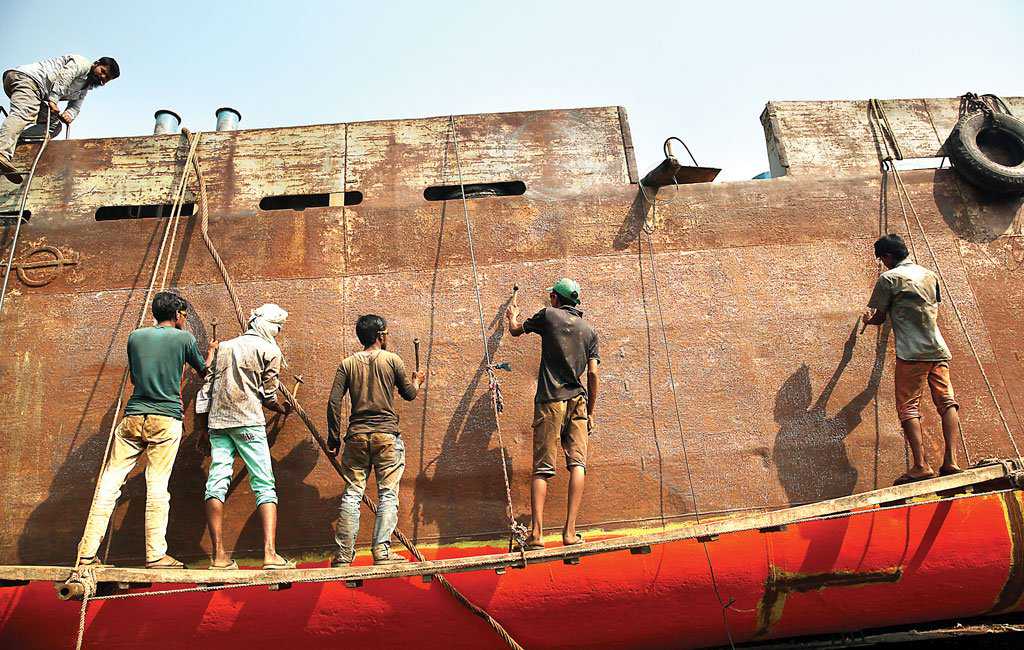What plagues our ship-breaking industry?

The ship dismantling process in Bangladesh started in 1974 but was not recognized as an industry until 2006. The Labour Act 2006 recognized it as an “establishment” covered by the unified labour standards of Bangladesh. This industry has already dismantled about 55% of end-of-life vessels of the world.
Though numbers give a sense of pride, the story behind the scene is different. Here, the industry is aided by the appropriate climate, a lengthy and plain inter-tidal zone, cheap labour, and less improvised environmental legislations. Environmental impacts from air, marine, and land pollution across the shipyards are alarming, however.
Almost all the shipyards cut ship hulls in an archaic method. Carbon, iron oxide, and organotin substance emissions from the ships’ anti-fouling paint pollute the air. Organotin contains TributylTin (TBT), the most notorious component in steel. The International Maritime Organization (IMO) banned the use of it in 2003. Additionally, cables burned to collect metals cause polyvinyl chloride and asbestos emission into the air, polluting it further.
In terms of oceanic pollution, when a ship reaches shore, anchored for low tide, anti-foul paints mix with the seawater and harm micro-organisms. The dismantling process also blends the harmful materials of ships into the marine sediments that harm the seashore soil. The soil turns almost into metallic-soil, as the area is filled up with heavy metals containing petroleum hydrocarbons and bacterial contaminants deteriorating all the usefulness of the seashore.
A European Commission report has showed that 40% of the seashore of Chittagong is used for ship-breaking, and with the wind from the sea, the organic pollutants are carried into the air of the city. The World Health Organization supported the view claiming that the carcinogenic risk limit is too high in the air of Chittagong.
Unfortunately, the government did not do much to preserve the health and environment despite being under the affirmative direction of Article 18 of the constitution of Bangladesh. If citizens far away from the shipyards are not safe, how can the workers’ health risks be downplayed?
The air in shipyards is toxic, and the workers are vulnerable to various diseases. This is on top of the innumerable accidents and casualties during ship dismantling -- the workers die in the long run regardless.
The Basel Convention 1989 is the main international legal mechanism to regulate the ship-breaking industry. This seeks to control the ways of ship-breaking and recycling management with a view to avoiding environment and health hazards for scrap ship importing countries. It further obligates the exporting countries to overtake the waste and hazardous substances’ disposal facilities. Bangladesh has clearly failed to cope up with the regulations.
Bangladesh is also a party to Law of The Sea Convention 1982 which emphasizes the preservation of environment by adopting protective measures. Following the spirit of it, Bangladesh enacted the Environment Conservation Act 1995. It has incorporated all the important directions mentioned in the convention.
Under this act, the ship-breaking yards must take environmental clearance certificates by submitting an environment management plan. Certificates are given without any examination and after the ships reach ashore. Whether the ship is with harmful materials or not, the shipyards start dismantling the ship by gaining a so-called “no objection certificate” and “environmental clearance certificate.”
Still, we dream of a comprehensively framed ship-breaking industry. The Bangladesh government can adopt ship-breaking under the Recycling Rules 2011 and shape the national committee under it to regulate the import of ships, examine the ships, and to emphasize on proper disposal facilities of hazardous waste.
Ministry of Industry along with Ministry of Forest and Environment may venture jointly to provide environmental clearance certificates, no objection certificates etc. Specific requirements should be given by the Ministry of Environment to provide all certificates to the ship-owners and yards.
Ship recycling and breaking plans should be submitted by the ship-owners to the Department of Environment. Bangladesh should comply with Basel Convention 1989 before importing any ship in the country by pre-cleaning ships in the exporting country. One-hull oil tanker ships should not be permitted to be imported as those are banned.
Ships with excessive amount of persistent organic pollutants should not be imported. And shipyards must be regulated and visited regularly by the Department of Environment. Of course, ultimately all the agencies must be provided with logistics to effectively adhere to environmentally friendly ship-breaking norms.
Source: https://www.dhakatribune.com